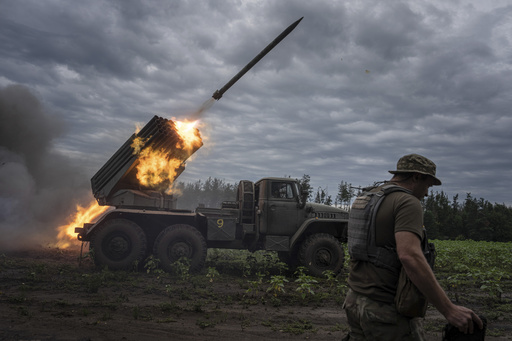
The sudden collapse of Syrian President Bashar Assad has initiated a fresh wave of strategic geopolitical interactions between Turkish President Recep Tayyip Erdogan and Russian President Vladimir Putin. With the aftermath of the unexpected developments in Damascus still being assessed, it appears that Turkey may currently hold the upper hand, having supported the successful rebel factions, while Russia has experienced a notable setback in its global influence.
“In the rivalry between Czars and Sultans, it’s currently Sultans 1, Czars 0,” remarked Soner Cagaptay, who leads the Turkish Research Program at a prominent Washington think tank. This scenario highlights that rather than acting as allies, Turkey and Russia find themselves as adversaries, with Turkey managing to outmaneuver Russia in this latest situation.
The potential downfall of Assad adds yet another layer to the intricate dynamics of the relationship between Putin and Erdogan. The interactions between these two leaders could have far-reaching consequences, not only for Syria but also for situations in Ukraine and their respective relationships with the United States. A blend of shared economic and security concerns, coupled with intense competition, paints a complex picture of their interactions. Although they often publicly commend each other, the underlying political and economic rivalries continue to simmer.
Erdogan has publicly noted his lofty standing among global leaders, stating, “As of now, there are only two important figures left in the world: me and Vladimir Putin.” This nod to Russia’s leadership underscores a complicated respect, as Putin repeatedly recognizes Erdogan’s political acumen.
The conflicting interests of Russia and Turkey began to emerge during Syria’s prolonged civil conflict, which has raged since 2011. These opposing stances escalated into serious confrontations, notably marked when a Turkish fighter jet downed a Russian aircraft near the Turkey-Syria border in November 2015, shortly following Russia’s commencement of air strikes in support of Assad.
In retaliation, Moscow imposed widespread economic sanctions on Turkey, halting imports and shutting down many Turkish enterprises operating in Russia. The flow of Russian tourists to Turkey also dwindled significantly. Facing substantial economic fallout, Erdogan offered a public apology, which initiated a quick thaw in diplomatic ties, particularly after Putin supported him during a military coup attempt in July 2016.
Negotiations between the two countries continued, leading to a ceasefire deal in 2018 targeting the rebel-held Idlib region along the Turkish border. Additionally, further agreements were sought in the ensuing years to stabilize the often-ignored arrangements. However, despite moments of cooperation in Syria, competition for influence extended into Libya, with Russia backing Khalifa Hifter and Turkey supporting rival groups based in Tripoli. Turkey also sought to enhance its influence in Central Asian nations that historically had ties to Russia.
In 2020, relations took another turn when Azerbaijan, with Turkey’s backing, achieved significant military success against Armenian forces over the disputed Karabakh territory, leaving Russia in a difficult position given its military connections to Armenia. The Kremlin thereafter has attempted to navigate complex relationships while maintaining connections with both Azerbaijan and Turkey.
Despite multiple points of geopolitical tension, economic exchanges between the two nations flourished, with Russia increasing natural gas exports to Turkey and constructing the nation’s first nuclear facility, alongside providing advanced military technologies, much to the disapproval of the U.S.
As the conflict in Ukraine began in 2022, relations between Russia and Turkey became even more crucial. The West’s sanctions against Russia limited its access to markets and finance; however, Turkey refrained from endorsing these sanctions, establishing itself as an essential conduit for Russia to international markets.
During this period, while Turkey supported Ukraine’s sovereignty and supplied military assistance, Erdogan also highlighted NATO’s role in escalating the conflict with remarks suggesting the U.S. and NATO’s involvement exacerbated tensions. Russia viewed Erdogan’s offer to mediate to achieve peace as a positive gesture.
The 2022 peace discussions hosted by Turkey between Russia and Ukraine in Istanbul quickly unravelled, leading both leaders to place blame on Western interventions for their failure. Later, Turkey collaborated with the U.N. to arrange for safe Ukrainian grain exports, which initially helped alleviate global food price spikes but ultimately collapsed the following year. Ankara’s balancing act is driven by its economic reliance on Russia for energy, tourism, and trade.
As Russia’s focus shifted primarily to Ukraine, its capability to exert influence in Syria diminished, allowing Turkey to maneuver strategically. Recently, Azerbaijan reclaimed control over Karabakh, significantly undermining Russia’s authority and complicating its relationship with Armenia, which is now leaning towards Western alliances.
Currently, Russia’s diminishing involvement in Syria is noticeable, especially as Iran’s backing of Assad wanes and Hezbollah withdraws its forces. Attempts made by Russia to mediate between Turkey and Syria met resistance from Assad, further isolating him during this turbulent period.
While acknowledging the shift created by Assad’s exit, some analysts suggest that Russia could still manage to retain a degree of influence by maintaining military bases and reaching out to regional players. Observers note that Turkey’s ultimate approach toward Russia will likely hinge on how relations with the U.S. progress. If the U.S.-Turkey dynamic improves, Erdogan might adopt a more assertive tone against Putin.
Conversely, if American alliances with Kurdish groups prove steadfast and obstruct Turkey’s interests in northern Syria, Ankara may feel compelled to maintain its multifaceted diplomatic strategies, as it has done for years. Putin has recognized Turkey’s motivations concerning border security, yet warned that Kurdish resistance may pose a greater challenge if pressured.
Experts view the repercussions of Assad’s downfall as a hindrance to Moscow’s influence but do not anticipate a complete rupture in the Russia-Turkey relationship, especially since their economic ties remain strong. Erdogan is likely to leverage this situation to extract favorable terms from Russia concerning energy and trade negotiations.

